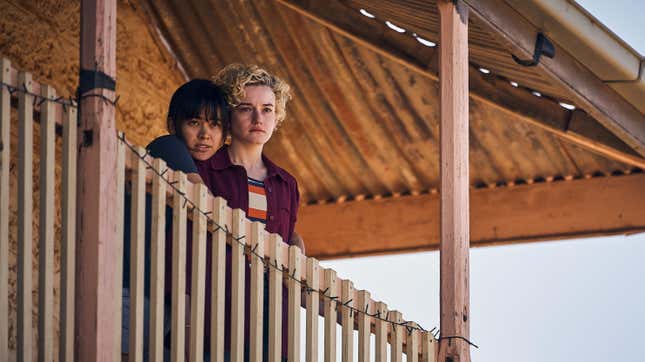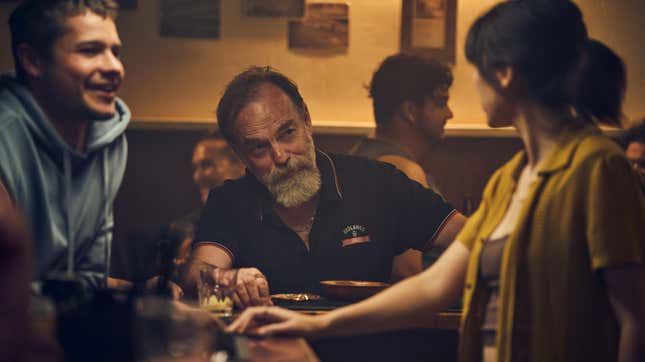‘The Royal Hotel’ Is a Different Kind of Scary Movie About Predatory Men
Writer-director Kitty Green on defying horror, vetting male actors, and refusing to depict rape in her thriller about two women working at a bar in the Outback.
EntertainmentMovies

In The Royal Hotel, two young, backpacking American women find themselves in the desolate Australian Outback and, well, Australian writer-director Kitty Green knows what you’re thinking. “As soon as you see an image of two girls with backpacks, in a remote location, it screams horror,” she told Jezebel recently in the office of Neon, her film’s distribution company. She opted for something more low-key than a maniac hunting humans, but in some ways it’s even scarier than that.
To make some money, her protagonists Hanna (Julia Garner, who worked with Green in 2019’s The Assistant) and Liv (Jessica Henwick) get bartending gigs at a pub called the Royal Hotel, whose clientele includes hard-drinking and consequently rowdy men. The movie puts them through an endurance test of microaggressions—one patron asks for a “Dicken’s cider,” and only when Liv repeats it back does she realize that he just asked for a “dick inside her” (someone played the same “joke” on Green when she was a patron of a Manhattan bar). The men gawk and drool, they trespass, they demand more than the makeout sessions they’re afforded, they use lighters with giant-breasted women on them casually. Garner’s Hanna gets a reputation for being sour and is constantly told by her boss Billy (Hugo Weaving) to smile.
Adapted from the 2016 documentary Hotel Coolgardie, The Royal Hotel is a movie about everyday horrors, though Green doesn’t consider it a horror movie. “I see it as a film about strength,” the director told Jezebel. “Julia’s character is slowly figuring out how to stand up for herself and how to pick up an axe in order to win that.” Even if the movie never quite becomes the hack-’em-up that viewers suspect it’s headed for, watching it is like sitting in an ever-tightening vise. Tense!
To Jezebel, Green talked about casting the right men, the politics of her work, and her refusal to write rape into her film. An edited and condensed transcript of our conversation is below.
JEZEBEL: What made you want to adapt a documentary into a narrative?
KITTY GREEN: I had just finished The Assistant and I saw the documentary. I’d seen a lot of films set in the Outback, but often through a male lens. I’d never seen it through the eyes of women in that environment. I was struck by how strong the women were in it in little ways. They’re kind of carving out their own strength throughout the film, which I thought was really beautiful. Also, immediately I thought, “Oh, is this something that Julia Garner and I can do together?” And that was exciting to me because we have such a lovely kind of collaborative partnership, I think.
What is it about her that makes you work so well together?
Energetically it just fits, and so it’s hard to really describe. We’ve gotten to the point now where I don’t know how much she’s bringing, how much I’m bringing. I don’t know where she ends and I begin. Sometimes I just walk up to her after a scene and she’s like, “No, I know what I did.” The words aren’t going to need to come out of my mouth a lot of the time.
Did you think about the genre as you were making this? Do you consider this a horror movie?
-

-

-

-

-

-

-

-

-

-

-

-

-

-

-

-

-

-

-

-

-

-

-

-

-

-

-

-

-

-

-

-

-

-

-

-

-

-

-

-










































